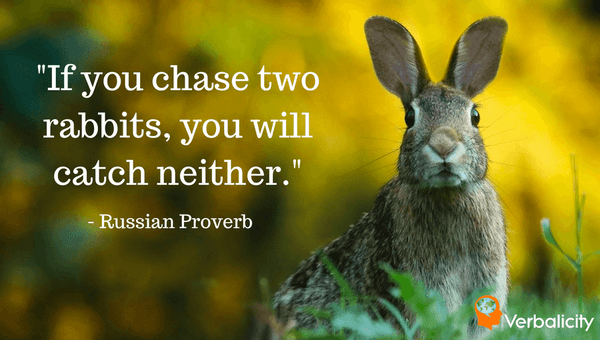The No BS Guide to Becoming a Fast Learner
Curated from: verbalicity.com
Ideas, facts & insights covering these topics:
8 ideas
·70.4K reads
488
12
Explore the World's Best Ideas
Join today and uncover 100+ curated journeys from 50+ topics. Unlock access to our mobile app with extensive features.
“Success demands singleness of purpose. You need to be doing fewer things for more effect instead of doing more things with side effects.”
GARY KELLER
1K
16.2K reads
Becoming a quick learner: One thing at a time
If you try to learn everything at once, you’ll waste too much time switching between activities and become frustrated with your lack of progress.
These days, many people proudly call themselves “multitaskers”. However, studies have shown that only 2% of people can actually multitask effectively and that switching between tasks costs us up to 40% of our productive time.
Fast learners know that in order to quickly pick up a new skill, it means giving it your undivided attention and having to say “maybe someday” to a dozen other things that you’re also interested in.
989
11.4K reads
Get started on the right foot
Once you’ve decided on a skill you want to learn, it’s time to do some preliminary research. You need to know what you’re getting yourself into.
The idea is to quickly familiarize yourself with the skill until you have a mental map that identifies:
- Keys to success
- Major pitfalls to avoid
- Subskills to focus on
Doing this work upfront will help you come up with a plan for learning, and avoiding mistakes that sabotage your progress.
The easiest way to start your research is to simply do a Google search with a few of the following terms:
- “beginner’s guide to” + skill
- “biggest mistakes” + skill
- “before you s
tart” + skill “things I wish I knew” + skill.
1.45K
9.5K reads
80/20 your way to success
Also called Pareto’s principle, the rule states that 80% of your results come from just 20% of your efforts.
- 80% of a business's profits come from 20% of its customers
- 80% of your time is spent with 20% of the people you know
- 80% of the fun you have come from 20% of the activities you do
A big part of becoming a fast learner is about breaking a skill down into smaller chunks. Then you can examine each chunk, and focus on the 20% that will have the highest impact while disregarding the trivial 80% that’s not going to make a real difference.
Another perspective: “What are the 20% of obstacles whic
983
7.46K reads
Becoming a quick learner: Speed over perfection
The problem with trying to practice perfectly is that you may end up spending way too much time overanalyzing and overthinking about how to get it “right”, rather than just doing it.
A case in point is the language learner who spends countless hours studying grammar because they don’t feel “ready” to speak yet.
Too often, the idea of perfect practice gets mixed up with our fear of making mistakes and being judged by other people. This leads to three things, none of which are good:
- Procrastination
- Unwillingness to take risks
- Frustration.
973
7.4K reads
Learn from the experts
- People will tell you that you need to find a mentor, but these days you can find dozens of them without even leaving your house.
- In the age of free information, more and more experts are offering their advice online and sharing their successes, failures, and secrets with anyone who will listen.
- It can be a tremendous source of motivation to follow in the footsteps of someone who has already done it. Not only will you benefit from their proven tips and tricks, it also helps you set realistic expectations for yourself so that you don’t become discouraged in the process.
749
6.13K reads
Becoming a quick learner: Get rapid feedback
There are two main ways you can do this:
- Get feedback from other people: When it comes to speaking a new language, for example, you can get immediate feedback by learning with a teacher.
- Setup your own feedback systems: If you’re learning to play guitar, you can make recordings of yourself playing, and listen back. When you listen back, you’ll hear things that you never noticed before.
A word of warning: getting feedback is sometimes the hardest part of learning a new skill. Most of us cringe at the idea of opening ourselves up to criticism.
802
5.81K reads
The 20-hour commitment
- Pre-commit to at least 20 hours of practice. As soon as you start learning a skill, you must finish the 20 hours, without giving up, no matter what.
- After the 20 hours, you’ll have experienced enough of the skill, and be far enough along the learning curve to decide if this is really for you.
- One of the easiest things to do is to make a commitment that forces you to show up, whether that’s a language lesson, a jam session with your friends, or a coffee with a potential customer.
- It’s important to note that the 20 hours need to consist of dedicated practice with 100% concentration. Simply thinking
about it or reading about it doesn’t count.
1K
6.35K reads
IDEAS CURATED BY
CURATOR'S NOTE
These are the keys to quickly learning any skill. If you apply these principles to your life, you’ll finally be able to call yourself a “quick learner”.
“
Robert H.'s ideas are part of this journey:
Learn more about career with this collection
Cultivating a growth mindset and embracing challenges
Developing adaptive thinking and problem-solving skills
Effective learning frameworks and approaches
Related collections
Similar ideas
8 ideas
8 ideas
Read & Learn
20x Faster
without
deepstash
with
deepstash
with
deepstash
Personalized microlearning
—
100+ Learning Journeys
—
Access to 200,000+ ideas
—
Access to the mobile app
—
Unlimited idea saving
—
—
Unlimited history
—
—
Unlimited listening to ideas
—
—
Downloading & offline access
—
—
Supercharge your mind with one idea per day
Enter your email and spend 1 minute every day to learn something new.
I agree to receive email updates





